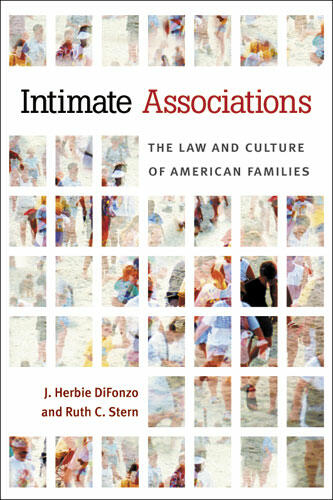Intimate Associations
The Law and Culture of American Families
The fluidity of modern families gives adults more personal choices, but it sometimes comes at the price of economic stability and social well-being
Description
The rise in divorce, cohabitation, single parenthood, and same-sex partnerships, along with an increase in surrogacy, adoption, and assisted reproductive technologies, has led to many diverse configurations of families, or intimate associations. J. Herbie DiFonzo and Ruth C. Stern chart these trends over the past several decades and investigate their social, legal, and economic implications.
Drawing upon a wealth of social science data, they show that, by a number of measures, children of married parents fare better than children in a household formed by cohabiting adults. This is not to condemn nontraditional families, but to point out that society and the law do not yet adequately provide for their needs. The authors applaud the ways in which courts and legislatures are beginning to replace rigid concepts of marriage and parenthood with the more flexible concept of “functional” family roles. In the conclusion, they call for a legal system that can adapt to the continually changing reality of family life.
J. Herbie DiFonzo is Professor of Law at the Maurice A. Deane School of Law at Hofstra University.
Ruth C. Stern is an attorney and social worker. She has worked with families in crisis and represented parents and children in numerous family court proceedings.
Reviews
"After deep and insightful analysis fully supported by quantifiable data and cogent reasoning, they conclude that a family law system that is based on presumptions that are no longer the reality is going to struggle in managing the complex issues that come before it for resolution. ... They appropriately advocate for a legal system and culture that recognizes and enforces legal parentage based on the function of parenting and the nature of the relationship of the parent figure with the child--whether that parent figure is a married spouse or a de facto parent. That is a conclusion that if vigorously applied in family courts and by the professionals engaged with families would go a long way towards bringing much needed clarity to family law and stability to the American family."
- Gary A. Debele
---Journal of the American Academy of Matrimonial Lawyers
"Intimate Associations provides a fascinating overview of issues important to the role of family law—and of families—in contemporary society. It does a masterful job of presenting the dilemmas facing family law as it responds to changing family structures. By exploring the difficulties in adapting traditional doctrine to the realities of today’s families, the book shows us where we’ve been, where we are, and the difficulties of moving forward. It nicely sets the stage to consider the limits of family law in addressing the increasingly classed nature of family structure."
- Naomi R. Cahn and June Carbone
---The Law and Culture of American Families

